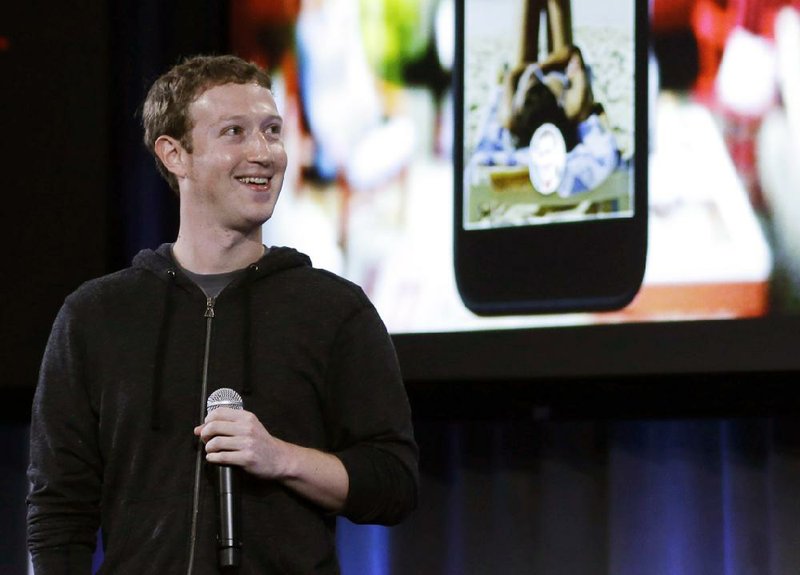Facebook Thursday unveiled smart-phone software Thursday that puts social networking features front and center on a handset, stepping up efforts to spur sales of advertising on small screens.
The new software, which the company calls Home, makes it easier to access Facebook features - such as friends’ photos, messages and status updates - on a smart phone’s home screen, Chief Executive Officer Mark Zuckerberg said at an event in Menlo Park, Calif. The application is available starting next Friday on Samsung Electronics and HTC phones that run Google’s Android operating system.
Now that the majority of users access Facebook via mobile devices, Zuckerberg needs ways to keep them engaged longer while coaxing advertisers to pay to place promotions on small screens. The company is betting that handsets with Facebook-centric software will do a better job wooing users and marketers than current downloadable applications, said Carl Howe, an analyst at Yankee Group.
“The problem with apps is they’re a click away from wherever you are,” Howe said. “Facebook wants to remove that barrier.”
HTC executives announced the HTC First device that will prominently feature Facebook’s Home application. Ralph De La Vega, head of AT&T Inc.’s mobile business, said HTC First will run on his company’s most advanced wireless network.
Home will have monthly updates, can be installed from Google Play, Google’s online app store, and will be available on tablets in the coming months, Facebook said.
Facebook isn’t building a smart phone or creating an operating system, Zuckerberg said.
Amazon.com uses a version of Android in the Kindle Fire tablet. In Amazon’s case, that means bypassing Google’s preloaded applications, such as Gmail, Google Maps and YouTube, which generate revenue for Google.
Software crafted by Facebook will more prominently display the social network on handsets and could challenge competitors such as Apple and Google for the attention of smart-phone users, Howe said.
“They’re not as mobile focused as Apple and Google are,” Howe said in an interview. “They need to play catchup.”
While the iPhone operating system is controlled exclusively by Apple, Google provides more flexibility with Android. Companies can take older versions of the software and customize it for their own services and preferences.
Zuckerberg has said he sees opportunities to push the company’s features deeper into mobile devices. Already, Facebook, along with Twitter, has been built deeper into the latest version of Apple’s software, enabling users to post easily to the social-networking service.
“I think people want it to be very integrated into all of the different devices that they have, and that’s what we’re going to focus on,” Zuckerberg said on a call with analysts in January. “So, rather than just building an app that’s a version of the functionality that you have today, I think making it so that we can just do - go deeper and deeper I think is going to be a big focus for us.”
A new Facebook-enabled handset follows earlier forays into mobile devices for the social-networking service.
HTC began selling “Cha-Cha,” an Android-based phone with a dedicated Facebook button to share music, photos and messages, in 2011. INQ Mobile Ltd. and Facebook that year also unveiled a phone with close integration of services, such as wall postings and photos.
While those devices have won over some die-hard Facebook fans, widespread adoption has been limited, according to Carolina Milanesi, an analyst at Gartner Inc. A new Facebook handset may struggle to match the success of devices made by Apple or Samsung Electronics Co., which manufactures the Galaxy line of phones, she said.
“I don’t think that Facebook as a brand will necessarily get consumers - that are your average Facebook users - to pick out that phone over a Galaxy or an iPhone,” she said.
After a 31 percent decline in Facebook’s shares since an initial public offering in May, through Wednesday, investors are looking for signs that the company can extract more ad dollars from promotions on mobile phones. The number of daily Facebook users on desktops and laptops fell in the fourth quarter as the portion of members on mobile devices increased, regulatory filings show.
Facebook’s nascent mobile ad service, started in March 2012, isn’t helping the company gain market share in the U.S., according to EMarketer Inc. Facebook is projected to grab 12 percent of the market in 2015, down from 13 percent this year, EMarketer said. Over the same period, Google’s stake will climb about 2 percentage points to 57 percent.
Facebook shares rose 82 cents to close Thursday at $27.07.
Information for this article was contributed by Adam Satariano, Tom Giles and Douglas MacMillan of Bloomberg News.
Business, Pages 25 on 04/05/2013

